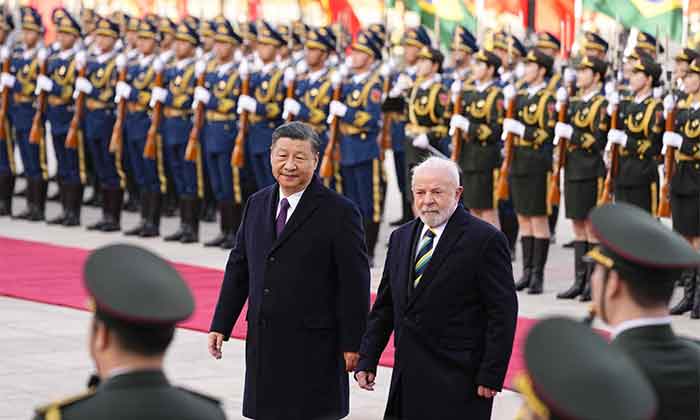
Brazilian President Lula da Silva said on Saturday: The U.S. and its allies should focus on promoting peace instead of fueling the Ukraine conflict by arming Kiev.
Lula has concluded a state visit to China, his country’s primary trading partner.
“The united States needs to stop encouraging war and start talking about peace,” Lula told reporters in Beijing. “The European Union needs to start talking about peace.”
He added that, in doing so, world leaders might be able to “convince” both Russian President Vladimir Putin and his Ukrainian counterpart Vladimir Zelensky that “peace is in the interest of the whole world.”
In contrast to many Western nations, neither Brazil nor China has imposed sanctions on Moscow following the onset of the conflict in Ukraine last year.
Prior to the trip, Lula, the left-wing leader who returned as Brazilian president after succeeding Jair Bolsonaro at the start of this year, had sought to position himself as part of a group that could mediate in the conflict. He did not elaborate on the nature of any such talks with Chinese President Xi Jinping following their meeting on Friday.
CNN reported earlier this week that Beijing had requested the removal of issues surrounding Ukraine from the list of topics to be discussed by the two leaders.
“It is important to have patience,” Lula suggested on Saturday. He said: “But above all, it is necessary to convince the countries that are supplying weapons, encouraging the war, to stop.”
China has been a key trading partner for Brazil since 2009. In 2022 alone, Beijing imported close to $90 billion worth of Brazilian commodities such as soy, iron ore and petrol. Brazil is also the largest single market for Chinese products on the South American continent.
Lula’s comments on Ukraine, as well as the strengthening of economic ties with Beijing, are likely to draw the attention of Washington, with whom Brasilia has sought a closer relationship under his rule. In February, he met with U.S. President Joe Biden in the White House, where they primarily discussed efforts to combat climate change and combat anti-democratic extremism.
Brazil Calls To Move Away From Dollar
Brazilian President Luiz Inacio Lula da Silva has stated that developing nations should move away from the U.S. dollar in favor of their own currencies in order to push back against U.S. dominance over the global financial system.
Speaking in Shanghai on Thursday during an official visit to China, Lula said the BRICS group – comprising Brazil, Russia, India, China and South Africa – should look for an alternative currency to the dollar for trade.
“Every night I ask myself why all countries have to base their trade on the dollar. Why cannot we do trade based on our currencies?” he said. “Who was it that decided that the dollar was the currency after the disappearance of the gold standard?”
The leftist leader went on to lament that “everyone depends on just one currency,” referring to the dollar, and proposed “a currency to finance trade relations between Brazil and China, between Brazil and other countries.”
Lula kicked off his trip to China with an event to mark the appointment of former Brazilian President Dilma Rousseff as the head of the New Development Bank, also known as the ‘BRICS bank,’ which he said could free emerging economies “from submission to traditional financial institutions, which want to govern us.”
Brazilian Finance Minister Fernando Haddad also traveled with the president to China, where he told reporters that Brazil would aim to create trade mechanisms for developing countries to bypass the use of the dollar.
“The advantage is to avoid the straitjacket imposed by necessarily having trade operations settled in a currency of a country not involved in the transaction,” he said.
Lula’s visit to China comes as Beijing increasingly promotes the use of its own currency, the renminbi, to settle international transactions. Last month, Russia said it had adopted the yuan as one of its primary reserve currencies amid a massive sanctions campaign linked to the conflict in Ukraine, highlighting a gradual shift away from the Western financial system by some major powers.
Trade between China and Brazil has seen a significant boost over the last decade, with more than $150 billion in business recorded last year. Chinese firms have bought up large amounts of minerals and agricultural goods in the South American country, and invested in Brazilian infrastructure.
The Brazilian president arrived in China on Wednesday night. He stayed in China until April 15. After his speech in Shanghai, Lula headed off to Beijing, where he met with President Xi Jinping on Friday. The two leaders focused on issues related to trade and foreign policy – such as China’s Belt and Road Initiative, which aims to develop roads, highways and other infrastructure in foreign countries – according to the Financial Times.
A Blow To U.S. Dollar-powered Bullying
A commentary said:
China and Brazil have secured a deal to conduct bilateral trade in their own respective currencies, eliminating the U.S. dollar as an intermediary.
The decision by Brazil and China to pursue non-dollar trade is an important geopolitical moment, and a sign that countries are seeking to move away from using the U.S. currency, in direct response to Washington’s abuse of the global reserve currency for its own hegemonic aims. Although the U.S. Dollar will of course remain a prominent force in global trade and economics, the U.S.’s ability to use it as a tool with which to bully and quash other countries is diminishing.















































